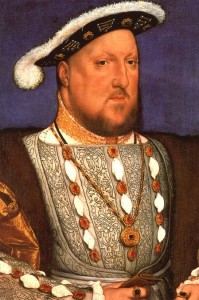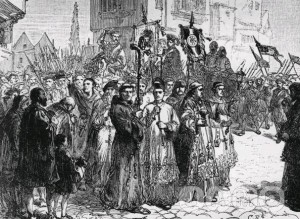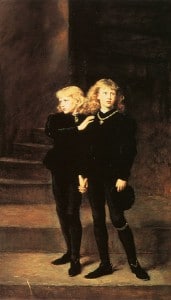
Thank you for all the wonderful responses to last week’s “Henry VIII: Renaissance Prince and King”. I think it’s so easy to forget that Henry VIII did not always look like Holbein’s iconic portrait and that he was actually a rather dashing and charismatic young man who was eager to stamp out corruption. Perhaps Jonathan Rhys Meyers has helped some people realise that there was something for those wives and mistress to be attracted to and love. The Henry VIII of “The Tudors” does turn into a monster, but there are times when I fell for him hook, line and sinker. We cannot credit Anne Boleyn with intelligence and then believe that Henry was all bad. In my opinion, they had a loving and very passionate relationship, and were similar in many ways, so Henry was not always the stereotypical monster we think of.
In his series “Henry VIII: The Mind of a Tyrant”, David Starkey said:-
“The 18 year old who was crowned here was a slim, beautiful, elegant, musical, poetical, reasonable, charming, sweet-tempered young man who’d married for love. How does he turn into the Henry who is the horror, the Henry who is the tyrant?”1
And this is the problem that we have with Henry VIII and Starkey is spot on when he says that “the man behind the myth is a psychological enigma”.
Last week I wrote about Henry VIII as a Renaissance Prince and King, giving contemporary quotations regarding his appearance, his character, his education and his virtues. There was rejoicing when Henry VIII came to the throne, and he was even likened to the Messiah, yet Holinshed’s Chronicle reports that around 72,000 people were executed during his reign – a huge number! But can we classify Henry VIII as a tyrant or is he misunderstood? Was he a tyrannical monster responsible for cruelty and brutality or was he simply a monarch doing all that he could to protect his country and his people? Hmmm…
Henry VIII: Did Henry Become a Tyrant?
Yes
As much as I love Henry VIII, and I do because he is such a compelling and fascinating character, I believe that he was a tyrant and monster. I’m still trying to understand what drove him and why he became the man that he did. I’m trying desperately to make sense of his psyche, what Eric Ives refers to as “the ultimate unresolvable paradox of Tudor history”2, but the conclusion I have come to is that from the mid 1530s onwards Henry VIII was a monster and there’s no persuading me otherwise. He may have done many great things during his reign but that does not stop him being a man who wanted absolute power at any cost and who used brutality to get that power.
Before we can label Henry VIII a tyrant, we first need to define what a tyrant is. In “1536: The Year that Changed Henry VIII”, Suzannah Lipscomb quotes an unnamed Italian who, after Henry VIII’s death in 1547, called the King “the greatest tyrant that ever was in England” and then went on to define a tyrant:-
“The principal token of a tyrant is the immoderate satisfaction of an unlawful appetite, when the person, whether by right or wrong, hath power to achieve his sensual will, and that person, also who by force draws unto him that which of right is not his, in the unlawful usurping commits express tyranny.”3
Lipscomb also gives a modern definition of “tyrant”:-
“A ruler who exercises his arbitrary power beyond the scope permitted by the laws, customs and standards of his time and society and who does so with a view to maintaining or increasing that power.”4
Whichever definition you feel best defines the word “tyrant”, I think Henry VIII fits them both.
So, why do I think he was a tyrant?
- Thomas More – This man was once Henry’s role model and great friend, yet Henry ordered him to be executed. Suzannah Lipscomb points put that More was originally arrested and imprisoned in April 1534 for refusing to swear the Oath of Succession yet a year later he was put to death for rejecting Henry VIII’s new title, Supreme Head, after Parliament had passed the Act of Supremacy in November 1534, and for committing treason because the Treason Act of February 1535 had made his words and deeds treason. How can he be charged with something that wasn’t made a treasonable offence until after he had done it? Hmmm…
- Anne Askew – I told the story of Anne Askew in “Anne Askew Sentenced to Death” last week. Here was a case of illegal torture and brutality, yet Henry turned a blind eye to it and may even have ordered the treatment dished out to Anne. She was linked to his wife, Catherine Parr, and his best friend’s wife, Catherine Brandon, yet Henry allowed Anne Askew to be racked “until the strings of her arms and eyes were perished” and then burned at the stake.
- Religious divisions and confusion– Don’t you feel sorry for Henry’s subjects? One minute it was ok to be Catholic but you could be burned as a Lutheran, the next minute you could be persecuted for being a Catholic! J J Scarisbrick writes that Henry VIII’s reign “saw the nation acquire a religious discord of a kind which it had not known before and which would soon become bitter and complex, sending fissures down English society to its lowest strata and setting neighbour against neighbour, father against son in a disunity from which that society has not yet fully recovered… this disunity first took root in Henry’s reign.”5
- Margaret Pole – In 1541, Henry VIII ordered the execution of Margaret Pole, Countess of Salisbury, for alleged treason. This frail 67 year old was executed because of her Plantagenet blood and because Henry could not get at her son, Reginald Pole, who had openly insulted the King. Historian Greg Walker writes that “the death of the septuagenarian Countess, so inform and weakened by interrogation that she had to be carried to the scaffold in a chair… marked the nadir of royal vindictiveness”6 and it is clear that the Countess was no threat at all to Henry and she was, in fact, his daughter Mary’s godmother and had been her governess.
- His treatment of others – The way he turned against those he had once loved or shown favour to: Thomas More, Bishop Fisher, Thomas Cromwell, Anne Boleyn, Catherine Howard, to name just a few. Plus, Lipscombe points out that he had a “manipulative role” in the coups against Thomas Cranmer, Stephen Gardiner and Catherine Parr. Author Elizabeth Norton writes of the coup against Catherine Parr: “By manipulating both the conservative faction at court and Catherine herself, Henry was able to achieve his ends. He demonstrated to Wriothesley, Gardiner and other members of his court that it was his will that was supreme. He also put Catherine firmly in her place and she never attempted to assert herself politically again during Henry’s reign.”7
- Physical violence and threats – We know from reports by ambassadors that Henry lashed out at his advisers, hitting Cromwell on the head, and when Jane Seymour begged her husband the King, on bended knee, to change his mind about the Dissolution of the Monasteries, “Henry pulled her roughly to her feet and warned her not to meddle in things which were not her concern , reminding her of the fate of her predecessor”8 Nice!
- The rise of Acts of Attainder and Executions – However prejudiced her trial, Anne Boleyn was at least given a trial, people like Thomas Cromwell and Catherine Howard were denied a trial, and due process, and were, instead, condemned by Act of Attainder. Lipscomb writes: “The incidence and circumstance of such executions before and after 1536, and especially the increasing tendency not to pursue conviction through due process and common law trial but through parliamentary attainder and a widening definition of treason, provides compelling evidence of Henry VIII’s increasingly savage temper and misanthropic character.”9
- His God complex – I have to agree with Martin Luther who said “Junker Heintz will be God and does whatever he lusts”10 Although there is no doubt that Henry was a highly religious man, I believe that he became corrupted by his power and rather than seeing himself as God’s appointed ruler of England he began to see himself as God of the land and became a ruthless despot.

- The Pilgrimage of Grace – In 1536, during the Pilgrimage of Grace, a priest described Henry VIII as “a tyrant more cruel than Nero, for Nero destroyed but part of Rome, but this tyrant destroyeth this whole realm.”11 and no wonder when we consider his actions when the rebels reopened some of the suppressed monasteries – Henry ordered the Duke of Norfolk to hang some of the monks from those monasteries from the steeple of their own church. He was understandably brutal to the ringleaders of the rebellion but he also ordered executions across the North of England as an example to the rest of the country. Richard Rex writes: “We learn a great deal about Henry from the way he dealt with this broad-based challenge to his entire regime. The idea of resorting to concessions or compromise was inconceivable for him.”12
- The Dissolution of the Monasteries – It can be argued that Henry VIII was trying to stamp out corruption in the Church by dissolving some monasteries but instead of spending the money on good causes – schools, hospitals, universities, almshouses etc., it went into the royal coffers.
- Henry’s treatment of his wife, Catherine of Aragon, and their daughter Mary – After the Great Matter had been resolved, Catherine was stripped of her title of Queen and ended her days in relative poverty and poor Mary saw her father ill treat her mother, was stripped of her title of Princess, was forced to wait on her step-sister, Elizabeth, and was threatened into signing the oath of succession. Why could Henry not treat these women with some compassion and respect?
- Anne Boleyn – Whatever your theory about Henry’s involvement in Anne Boleyn’s downfall, his actions are beyond understanding. How could he pretty much shack up with another woman, his wife’s maid, Jane Seymour, while his wife was in the Tower waiting to die? How could he marry Jane Seymour just 11 days after Anne Boleyn’s execution. Anne Boleyn was surely the love of his life, the woman he had waited so long for and broken with Rome for, yet he managed to cast her aside and move on incredibly easily. He may even have plotted her downfall and probably did, if you consider that nothing happened at court without the King’s “say so”.
Those are just a few of the reasons why I believe Henry VIII was a tyrant, however, some do not agree.
No
- He did what was necessary – In the prologue of “1536”, Lipscombe writes that “The prevalence of religious belief meant that crime was conceived of as evidence of sin… As such, painful and spectacular punishment was thought necessary both to deter others and to cleanse society from the disorder and pollution of the criminal’s sin”13, so perhaps it can be argued that Henry VIII’s sometimes brutal actions were necessary for the good of his realm.
- Even his people did not see him as a tyrant – Lipscombe writes that even in the late 1530s his contemporaries were describing him as “gifted, courageous, gentle, noble, brilliant and accomplished” p24. Also after his reign he was remembered fondly as “Bluff King Hal” and his daughter, Elizabeth I, queen of public relations, knew that she should draw on his memory, styling herself as “the lion’s cub”, because he had been a popular and well-loved King.
- He had always been a tyrant – J J Scarisbrick says: “Henry was not notably more cruel afterwards [after his 1536 accident] than he had been before.”14 – The idea that his tyranny did not spring from nowhere, it had always been in his character. He did not become a tyrant.
- The Pilgrimage of Grace – Henry’s belief that he was only accountable to God and that the rebels had no right to rebel against him15. Henry was simply squashing an illegal and ungodly rebellion.
- Punishments and executions – Henry VIII was simply responding to threats and “he remained convinced of the lawfulness, wisdom and benevolence of his actions” and “by Henry’s own estimation, he was doing the things a good King did – it was only his rebellious subjects who were deviating from the orthodox and proper way.”16
- We cannot judge a 16th century king by our 21st century standards – He may be seen as a tyrant by today’s standards but he was simply being a successful monarch an doing what was needed to keep the peace.
- Context – Henry was simply reacting to the context he lived in: “For the world into which Henry was born was scarred by hatred, treason and betrayal. For almost 50 years there had been two royal families in England – the House of York and the House of Lancaster – and time and again their rivalry had erupted into bloody civil war, the so-called Wars of the Roses.”17 We have to remember that the disappearance of the Princes in the Tower had happened only 8 years before Henry VIII was born. These were dark times and the Tudors were seen by some as usurpers and not the true heirs to the throne. Henry VIII had to do all he could to secure the throne and deal with any challenges.

What Happened?
What happened to turn the “chivalrous warrior prince” into the “tyrant of legend”18? How can we come to terms with a man who was great in many ways but also so cruel and tyrannical.
J J Scarisbrick has this to say of Henry VIII in his conclusion to his book “Henry VIII”:-
“Henry was a huge, consequential and majestic figure. At least for some, he was everything that a people could wish him to be – a bluff, confident patriot king who was master of his kingdom and feared no one. By the end of his long reign, despite everything, he was indisputably revered, indeed, in some strange way, loved. He had raised monarchy to near-idolatry. He had become the quintessence of Englishry and the focus of swelling national pride. Nothing would ever be quite the same after he had gone.
Yet, for all his power to dazzle, for all the charm and bonhomie, which he could undoubtedly sometimes show, and for all the affection which he could certainly give and receive, it is difficult to think of any truly generous or selfless action performed by him and difficult not to suppose that, even those who enjoyed his apparently secure esteem, like Jane Seymour or Thomas Cranmer, would not have been thrown aside if it had been expedient to do so, along with the many others who had entwined their lives around his, given him so much, and yet been cast away.”
There were definitely two sides to the man and monarch but the good does not cancel out the bad, perhaps absolute power does corrupt absolutely.
In my next article in this series, I will be examining the different theories regarding why Henry turned into a tyrant. Interesting stuff!
Notes and Sources
- Henry VIII: Mind of a Tyrant, David Starkey (DVD)
- Eric Ives quoted in 1536: The Year That Changed Henry VIII, Suzannah Lipscomb, p14
- 1536: The Year That Changed Henry VIII, Suzannah Lipscomb, p185
- Ibid.
- Henry VIII, J J Scarisbrick, p655 of my old and battered Methuen version
- Greg Walker quoted in 1536: The Year That Changed Henry VIII, Suzannah Lipscomb, p196
- Catherine Parr in Danger, article by Elizabeth Norton
- Henry VIII, Richard Rex, p95
- Lipscomb, p191
- J J Scarisbrick, p677 of my old and battered Methuen version
- Lipscomb, p203
- Rex, p95
- Lipscombe, p21
- Scarisbrick, p25
- Lipscomb, p159
- Lipscomb, p202
- Henry VIII, Mind of a Tyrant
- Ibid.
- Scarisbrick, p653